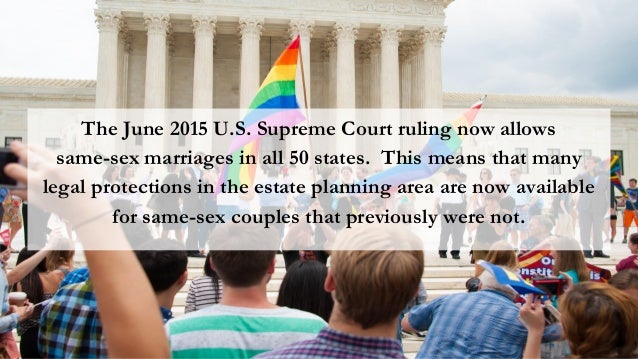 In the wake of the Supreme Court’s landmark ruling in Obergefell v. Hodges, same-sex couples nationwide finally enjoy marriage equality. And, whether you are legally married in the eyes of the law, or not, there are important additional legal planning steps you need to take to ensure your wishes are honored in the event of your disability, or your death.
In the wake of the Supreme Court’s landmark ruling in Obergefell v. Hodges, same-sex couples nationwide finally enjoy marriage equality. And, whether you are legally married in the eyes of the law, or not, there are important additional legal planning steps you need to take to ensure your wishes are honored in the event of your disability, or your death.
Marriage affords certain legal rights – and responsibilities – that domestic partnerships, civil unions and simply living together with or without a written agreement do not. By, ensuring your estate planning documents are up to date, you can safeguard your surviving spouse’s federally protected rights. And, if you are not married in the eyes of the law, for whatever reason, you can use estate planning to replicate many of the marital rights, as well.
A significant concern of many same-sex couples is whether one spouse will retain beneficiary rights if the other spouse dies. Unfortunately, before marriage equality, it was often the case that same-sex partners were deprived of certain rights that opposite-sex spouses enjoyed. These rights pertain to assets such as retirement accounts, social security benefits, and insurance policies.

The Employee Retirement Income Security Act (ERISA) requires same-sex spouses be treated equally in the event one spouse dies. This means ERISA governed retirement plans such as 401Ks are handled just as they would be in any marriage; the surviving spouse is the automatic beneficiary of the plan. Retirement accounts not governed by ERISA may have different rules, so check with your individual plan regulations. The Social Security Administration treats all marriages equally, and so the SSA’s rules and restrictions apply to married same-sex couples.
This means that if you want your 401k to go to anyone other than your surviving spouse, you need to take specific action, beyond merely naming another beneficiary.
Marriage offers many important rights. And, sometimes, creates a reality that you may not have intended. Conversely, if you are partnered, but not married in the eyes of the law, your life partner could be cut out of your affairs are the end of your life, or in the event of a disability.
Regardless of marriage equality, it is still critical to understand exactly what will happen to the people you love and everything you own and care about, when something happens to you, under the State’s plan for you. . That’s what our Family Wealth Planning Sessions are all about — you making informed, empowered, educated decisions for the people you love.
We don’t just draft documents, we ensure you make informed and empowered decisions about life and death, for yourself and the people you love. That’s why we offer a Family Wealth Planning Session, during which you will get more financially organized than you’ve ever been before, and make all the best choices for the people you love.


Recent Comments